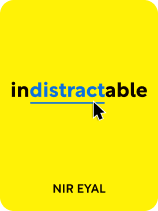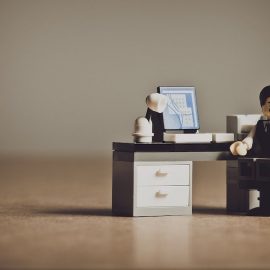

This article is an excerpt from the Shortform book guide to "Indistractable" by Nir Eyal. Shortform has the world's best summaries and analyses of books you should be reading.
Like this article? Sign up for a free trial here .
Does your work often get interrupted by emails or group chats from coworkers? Is there a polite way to put off answering emails?
One of the biggest distractors at work is email. Reading and responding to emails takes a lot of time, not to mention that switching tasks makes your work take even longer to complete. Thankfully, Nir Eyal came up with a solution that will reduce your email distractions.
Here is Nir Eyal’s advice for when you get distracted at work.
Email Distractions at Work
If you’re distracted at work, reducing the number of emails you receive each day will drastically reduce the amount of time you spend in your inbox. The second step is to set up a system that reduces the amount of time you spend responding to those you do let through. The most efficient way to deal with your emails is by going through them in batches during dedicated email timeboxes, rather than dealing with them as they come in. Processing your email in this way has two advantages:
- This reduces the number of times your brain needs to switch between tasks (meaning you lose “refocusing time” once, instead of many times throughout the day).
- You can schedule it—so that it becomes the thing you mean to do, instead of the thing dragging you away from what needs to get done.
Make your batch-processing as efficient as possible by eliminating the need to check emails repeatedly. Many people open messages, scan the contents, reply to anything urgent, and then leave everything else for later. By the next time you check your email, you’ve forgotten what the “everything else” emails said, so you open them again. This happens every time you check your email—you read the same emails, multiple times a day.
The main reason you read emails multiple times is to discern exactly when you need to reply to them—fix the issue by categorizing your emails by reply urgency. To do this, create two email tags: “Today” and “This Week.” Each time you check your email, answer anything that needs an immediate reply, then tag the rest to be answered during your email timebox later in the day or later in the week. This system ensures that you only read each email twice: when you initially receive it and when you reply.
Distracting Group Chats
Having a group chat feature at work can be helpful for chatting about ideas or getting quick answers, but it’s also distracting in several ways. First, the messages you’re receiving all day are from different people, in different channels, about different subjects—essentially, part of your brain is in numerous meetings covering diverse topics all day, while you’re trying to focus on your own work. Second, many people use group chat to fire off thoughts one sentence at a time. Receiving ideas as a stream of consciousness can make you feel frazzled, and the constant message alerts don’t help.
Create Group Chat Guidelines
Set three rules around your group chat use so that it shows up in your workday as a tool for traction, rather than invading your workday as a distraction.
1) Use Group Chat Sparingly
While the real-time feature of group chat can be useful and engaging, think of it as you would any other real-time communication.
- For example, you wouldn’t agree to be on a conference call all day with six people who occasionally call for your input while you’re trying to do your work.
In the same way, set boundaries around how much of your time and attention people can have via group chat. There are two ways to do this:
- Timebox group chat sessions. Schedule time to scan for missed messages, send out replies, or scroll through different channels. Communicate your schedule to your colleagues so they understand when they can expect replies. When you’re not online, set an “away” message such as, “I’m not checking messages now but will be online later. If your issue is urgent, please call me or stop by my desk.”
- Organize meetings. If you have to discuss an issue that doesn’t necessitate an in-person meeting, set up a time for everyone to be in the group chat together to talk in real-time. This not only saves everyone from being pinged at random all day but also prevents the disruption of going to an in-person meeting.
2) Keep Groups Small
If you’re creating a chat group, limit invitees to those who will truly contribute to the conversation and benefit from it—usually the two or three people who are most relevant to the issue. Everyone has a chance to contribute to these smaller discussions, and less central parties can be updated later via email.
3) Use Group Chat for the Right Topics
This isn’t the right communication medium for sensitive topics or large issues, for several reasons. First, when it comes to sensitive topics such as criticism or HR decisions, everyone needs to be able to contextualize what’s being said with body language, tone, and mood.
Second, when it comes to complicated issues, it can be difficult to follow along with people’s short, stream-of-consciousness messages while others are replying, reacting with emojis, and so on. Amid the distraction, you may miss important information or be unable to see a connection you’d normally pick out quickly.
- If you must deal with a complicated issue on group chat, have the person raising the issue put all of their ideas and arguments into a document that’s shared with the group before the discussion.
Generally, group chat should only be used for quick, relatively unimportant matters, such as asking for confirmation on information or letting someone know you’ve taken care of an issue.

———End of Preview———
Like what you just read? Read the rest of the world's best book summary and analysis of Nir Eyal's "Indistractable" at Shortform .
Here's what you'll find in our full Indistractable summary :
- How to become indistractable in a world full of distractions
- Why your schedule should be based on your values instead of tasks
- How to start driving your life instead of letting its distractions drive you






